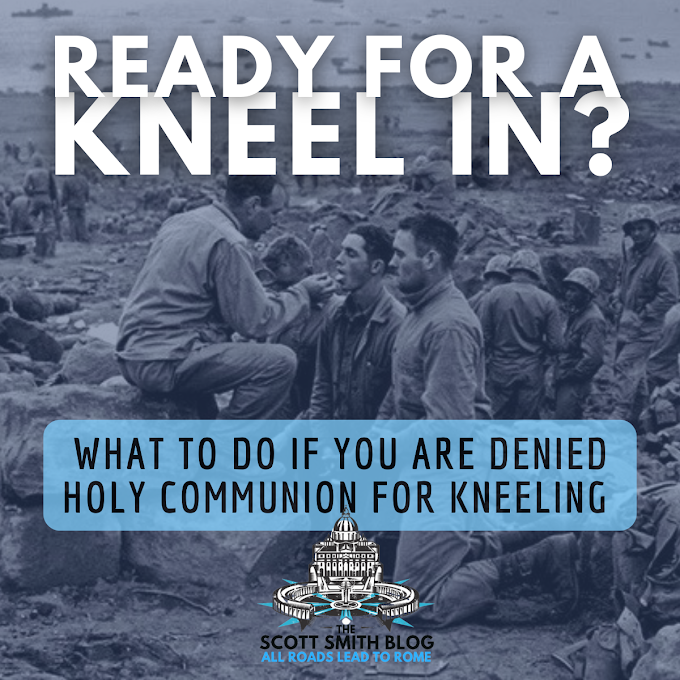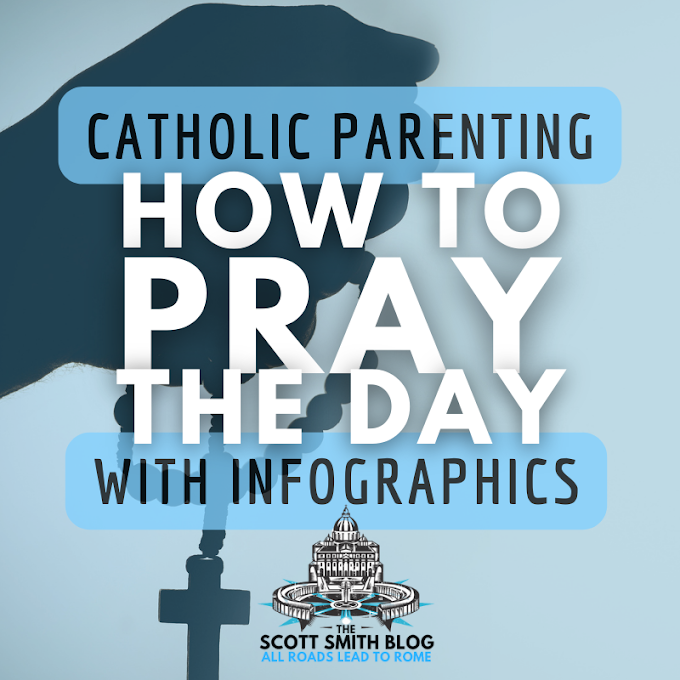Have you ever wondered whether Eucharistic Ministers -- that is to say, Extraordinary Ministers of Holy Communion (EMHCs) -- are allowed to give blessings at Mass?
Is this allowed? Is the blessing just a nice greeting from the minister at Mass? Is this another oddity that just crept into the liturgy over time? Is this just innocuous? Is it scandalous or confusing? Is this like the Church blessing or condoning whatever sin is preventing somebody from receiving the Eucharist?
What are the Church's rules on this? What does Canon Law say? See below.
You encounter this a lot. Extraordinary Ministers of Holy Communion (EMHCs) that were trained to bless people who come up with arms folded or children that have not yet received their First Eucharist.
Are Extraordinary Ministers allowed to trace a cross on children's foreheads or lay on heads in the communion line? If not, what's the alternative? What's a Extraordinary Minister to do?
The short answer is ...
No. If you're not ordained (or a Parent/Godparent at a Baptism), don't do it.
Here are several Church sources of liturgical norms and laws, plus some helpful advice from Archbishop Chaput, explaining this topic:
What Does Canon Law Say About Eucharistic Ministers Giving Blessings in the Communion Line?
§1. Those marked with the episcopal character and presbyters permitted by law or legitimate grant can perform consecrations and dedications validly.§2. Any presbyter can impart blessings except those reserved to the Roman Pontiff or bishops.§3. A deacon can impart only those blessings expressly permitted by law.
From the Vatican's Congregation for Divine Worship: "On Giving Blessings During the Communion Rite"
In case you need another authority for this rule besides Canon Law, here you go:
Several sources online cite a private response from the Congregation of Divine Worship (CDW), but it's hard to find the full text. I have reproduced the full text below.
Before I give you the CDW's answer, I should first provide the question. Two men wrote to the Congregation for Divine Worship and the Discipline of the Sacraments (CDW). They asked if there are “particular guidelines or restrictions” concerning the practice of a minister or extraordinary minister giving the person a blessing.
What about giving blessings to people who come forward in the Communion line but who are not receiving Communion? Should a priest, deacon or an extraordinary minister of Holy Communion give the person a blessing instead?
What if a person who is not receiving Communion presents himself with arms crossed over the chest, during the regular administration of Communion?
The CDW's response is a letter (Protocol No. 930/08/L) dated November 22, 2008 and signed by Father Anthony Ward, SM, Under-secretary of the Congregation
The letter said that “this matter is presently under the attentive study of the Congregation”, so “for the present, this dicastery wishes to limit itself to the following observations”:
1. The liturgical blessing of the Holy Mass is properly given to each and to all at the conclusion of the Mass, just a few moments subsequent to the distribution of Holy Communion.
2. Lay people, within the context of Holy Mass, are unable to confer blessings. These blessings, rather, are the competence of the priest (cf. Ecclesia de Mysterio, Notitiae 34 (15 Aug. 1997), art. 6, § 2; Canon 1169, § 2; and Roman Ritual De Benedictionibus (1985), n. 18).
3. Furthermore, the laying on of a hand or hands — which has its own sacramental significance, inappropriate here — by those distributing Holy Communion, in substitution for its reception, is to be explicitly discouraged.
4. The Apostolic Exhortation Familiaris Consortio n. 84, “forbids any pastor, for whatever reason to pretext even of a pastoral nature, to perform ceremonies of any kind for divorced people who remarry”. To be feared is that any form of blessing in substitution for communion would give the impression that the divorced and remarried have been returned, in some sense, to the status of Catholics in good standing.
5. In a similar way, for others who are not to be admitted to Holy Communion in accord with the norm of law, the Church’s discipline has already made clear that they should not approach Holy Communion nor receive a blessing. This would include non-Catholics and those envisaged in can. 915 (i.e., those under the penalty of excommunication or interdict, and others who obstinately persist in manifest grave sin).
The Congregation’s clarification is very straightforward and helpful. Extraordinary Ministers of Holy Communion (EMHCs), who are always laity, cannot give sacramental blessings within Mass. Very simple.
This instruction is especially helpful to pastors in parishes where inappropriate blessings during Communion have crept in over the years and become common.
What About Young Children? Can EMHCs Give A [Hand] Blessing to Little Children Who Join the Communion Line Before Receiving Their First Communion?
The CDW letter did not directly mention young children. They did answer the question, though.
Short Answer: Lay people cannot give blessings as part of the Mass.
It is common for little children who have not yet received First Communion to accompany their parents in the Communion line. Leaving little ones behind in the pew isn't a great idea, speaking from personal experience.
Little children cross their arms over their chests and walk in line with their parents. This is both a signal to the minister that they are not receiving Communion, and as an expression of the child’s reverence for the Blessed Sacrament.
This is great! This reverent gesture of a young child is good and appropriate.
However, sometimes the extraordinary minister interprets the child’s gesture as a request for a special blessing. This is done as a sort of “substitute” for Communion. Don't want anybody to feel left out! But ...
The CDW clarifies that there should not be separate blessings for any person during the Communion rite.
Why? The CDW provides a few reasons:
(1) "Lay people, within the context of Holy Mass, are unable to confer blessings." [and EMHCs are always lay people]
(2) The priest’s blessing at the conclusion of Mass includes everyone. The CDW emphasizes that the final blessing at the conclusion of the Mass occurs "just a few moments subsequent to the distribution of Holy Communion."
If Eucharistic Ministers (EMHCs) Can't Bless Children in the Communion Line (And They Can't), What Should They Do?
A little child comes up to you in the communion line and, with his or her sweet eyes, looks up to you expectantly. What do you do?
Ignore them? NO!
There are some good alternatives, but let's first negate the bad alternatives!
Can Eucharistic Ministers (EMHCs) Put Their Hands on the Child's Head in Blessing?
The "Laying on of hands" carries quite a bit of weight. It is a significant liturgical gesture. This happens, for example, at the Sacrament of Confirmation and the Sacrament of Holy Orders ... and often by the Bishop.
Instead of the little child receiving a blessing, a lay person looks like they're short-circuiting the child's path to Confirmation and Priesthood. Yikes.
This is obviously an impossibility and exaggeration, but hopefully it describes the absurdity of a lay person "laying on hands" during Mass.
So, EMHCs, don't do that.So What Can an Extraordinary Minister of Holy Communion Do for a Child in the Communion Line? Great Advice from Archbishop Chaput
What's an Eucharistic Minister to do? If an EMHC can't give a blessing, what do they do?
What should be done when someone approaches an EMHC with arms crossed? Some Churches have adopted the practice of smiling at the person, which seems either creepy or inadequate.
Both children and adults can make a spiritual communion. They may come forward with their arms crossed and bow before the Eucharist. Then the priest, deacon or extraordinary minister could say to them kindly, 'Receive the Lord Jesus in your heart.' This is not a blessing, but an invitation to worship, so no gestures are made.This spiritual communion would more authentically carry out the spirit of the liturgy. Being faithful to the truths of the sacramental celebration allows all of us, young and old, to enter more deeply into worship.
Thanks, Archbishop Charles Joseph Chaput! (Wish you weren't Archbishop Emeritus)
Here is the full letter from Archbishop Chaput, if you're interested:
As members of the community move forward to receive holy Communion during Mass, parents will often bring their small children along. Over the years, it has become a custom in many parishes for these children to receive a blessing. I don't really know where this practice began, but it's worth some reflection.
Usually the children in line will look up expectantly at the person distributing holy Communion. The minister then responds by doing one of several things: He or she may pat the child's head, or touch the head in a sign of blessing, or mark the child's forehead with a sign of the cross. As warm and well intentioned as the gesture may be, in the context of the liturgy, the Communion procession really isn't the time for a blessing of children or adults who are unable to receive Communion.
There are times in the liturgical year when the laity assist in specific acts of blessing, such as the blessing of throats or the distribution of ashes. These are clearly indicated in the Book of Blessings. But extraordinary ministers of holy Communion do not ordinarily have a commission to bless in the name of the Church, as priests and deacons do. At this point in the liturgy, they have a very specific function: to collaborate with the clergy in the distribution of holy Communion.
As we'll explore in a later column, the blessing of the assembly properly occurs at the end of the Mass. As the body of Christ, the assembly is blessed together before we depart to live the fruits of the liturgy.
What would be appropriate for children to do who accompany their parents in the Communion procession, and adults who do not receive Communion?
The Communion procession is an opportunity for parents to begin to teach their children about the great gift of the Eucharist. First of all, children could learn to give reverence to the Lord hidden under the forms of bread and wine. Children can already learn from their parents, and others receiving holy Communion, to give honor to the Lord by bowing reverently.
Parents and catechists should start teaching the mystery of the Eucharist at an early age. Children will soon begin to desire to receive holy Communion. This earnest desire to receive our Lord sacramentally is traditionally called a 'spiritual communion.' Regrettably, we don't talk about spiritual communion as we once did. But Thomas Aquinas, Alphonsus Liguori and many other great saints strongly encouraged spiritual communion as a practice.
Both children and adults can make a spiritual communion. They may come forward with their arms crossed and bow before the Eucharist. Then the priest, deacon or extraordinary minister could say to them kindly, 'Receive the Lord Jesus in your heart.' This is not a blessing, but an invitation to worship, so no gestures are made.
This spiritual communion would more authentically carry out the spirit of the liturgy. Being faithful to the truths of the sacramental celebration allows all of us, young and old, to enter more deeply into worship.
Archbishop Chaput explains the issue in his characteristically lucid manner. His statement is not a formal liturgical norm, but it does provide practical guidance to pastors on this issue.
Concluding Note: Blessing Our Children and Godchildren Outside the Mass
Just because lay people cannot bless children during Mass does not mean we can't bless children outside of Mass.
Liturgical laws and norms restrict the imparting of liturgical blessings to ordained ministers. This does NOT mean lay people are forbidden from using similar gestures in non-liturgical settings. Not at all.
I bless my kids every chance I get! I bless them when I tuck them in at night. I trace the sign of the cross on their heads as they leave for school. I bless my kids pretty much whenever they leave my sight.
... because it's awesome.















11 Comments